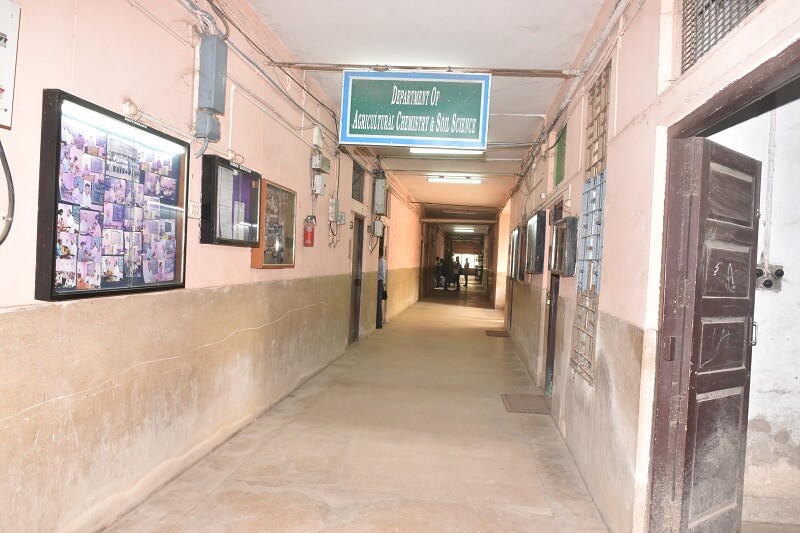The Department of Agricultural Chemistry and Soil Science started its journey in the year 1964 with one teacher and five M. Sc. (Ag.) students under the University of Kalyani and later, it was enriched with the joining of few other faculties. The department took its shape with the birth of Bidhan Chandra Krishi Viswavidyalaya on 1st September 1974 after bifurcation of the University of Kalyani. The department flourished within a span of few years after receiving a good number of All India Coordinated Research Projects related to this subject. During 1990, the department along with the others was relocated at the present Campus in Mohanpur. While the teaching strength of the department during mid-90’scrossed 40, it shrank to around 25 with thecreation of two new departments, namely “Agricultural Biochemistry” and “Agricultural Chemicals”. Prof. S. C. Das, Prof. L. N. Mandal, Prof. N. A. Chowdhury, Prof.A. K. Mukhopadhyay, Prof. B. Ghosh, Prof B. K. Dey, Prof. N. C. Debnath, Prof B. Das, Prof. S. Mallick, Prof. Asit Das, Prof. J. N. Hajra, Prof.. R. K. Basak, Prof. S. K. Sanyal and other nationally and internationally reputed teachers and researchers were the faculties of this department. Some of the other teachers are recognized nationally for their academic excellence as the fellow of different professional societies and National Academies. The Department flourished with the specialization of Soil Chemistry, Soil Fertility, Soil Physics and Soil Microbiology and occupied a unique position among the State Agricultural Universities in the country through its excellent teaching and research activities recognized nationally and internationally.
The department has always remained endowed with versatile, knowledgeable and distinguished teachers who displayed their excellence and experiences not only through world-class teaching but also through innovative research ideas. The research findings have beenpublished in peer reviewed journals of National and International repute. A large number of teachers of the department had shared their experiences through publication of text books/ book chapter in theirrespective fieldsby National and International publishers and thus have contributed towards knowledge build up. The teachers of the department, from time to time, organized short term training programmes, symposia/conference, summer/winter schools and workshops. Apart from academic and research activities, teachers of the department also shouldered the responsibilities of different administrative positions fromthe Dean of Faculty, Director of Research to Vice-Chancellor of this University.Teachers of the department have been handling different Adhoc Research projects, NATP, NAIP funded by ICAR, RKVY- Govt. of India, NFSM-ICAR, CSIR-Govt. of India, BRNS project funded by DAE, Govt. of India, Govt. of West Bengal and different NGOs. Earlier, the AICRP on ‘Recycling of Organic Wastes’, ‘Biological Nitrogen Fixation’, ‘Pesticide Residues’ were associated with the department and at present AICRP on ‘Soil Test Crop Response Correlation’ and ‘Micro and Secondary Nutrients and & Pollutant Elements’ are operational. The department has also direct link with the Survey Selection and Mass Production of Nodule Bacteria. The department has prepared micronutrient deficiency maps of West Bengal. The department has been working on contamination/remediation of heavy metal and pollutant elements in soil and plant system; transformations of different macro and micro nutrients under different agro-climatic zones and management practices, isolation of native microbial strains for exploring their abilities in nutrient transformation and remediation of pollutants.
At present, 18 Teachers in Mohanpur campus specialised in the field of Soil Chemistry, Soil Physics, Soil Fertility and Soil Microbiology are associated with different UG, PG and Ph D courses.In undergraduate level, the department caters 5 compulsory courses, 3 elective courses and 2 ELP courses in Agriculture Faculty; 4 compulsory courses for Horticulture Faculty and 2 compulsory courses in Agricultural Engineering Faculty. The department offers 13 courses for Master degree programme and 8 courses for Ph D programme.
The department has got four UG and eight PG laboratories with basic and sophisticated instruments and equipments for different practical classes and analysis of soil, plant and water samples. In addition to these laboratories, the students also have full access to the laboratories available with ‘Survey Selection and Mass Production of Nodule Bacteria’;‘Biofertilizer production unit’ under RKVY; AICRP on ‘Soil Test Crop Response Correlation’; ‘Micro and Secondary Nutrients and & Pollutant Elements’‘ Cropping System Research’ ; Arsenic Research Laboratory (funded by MIC Agriculture, Govt. of India), ‘Farmers Service Centre for Soil Testing and Fertilizer Recommendation’ (funded by RIDF project); Centre for Advance Agriculture Science & Technology ( CAAST) project.
Vision & Mission
- To maintain the legacy of excellent teaching and research activities through continuous improvement.
- To promote the Department towards school of excellence in Soil Science at national and international level.
- With this vision, Department, takes a constant initiative to improve the academic standard of the students and produce knowledgeable and trained human resource so that they can lead development initiatives in different government and non-government institutions.
- The Department, in association with different research projects, has been striving to formulate management options to be disseminated to the farmers through extension wing of the University/State Government for improving soil health and sustain productivity.
Service and Outreach
- Extending service to the farmers through the ‘Farmers Service Centre for Soil Testing and Fertilizer Recommendation” and a Mobile Soil Testing Van (funded by RIDF project)
- Production and promotion of quality biofertlizers under the aegis of ‘Survey Selection and Mass Production of Nodule Bacteria’ and RKVY project on “Establishment of biofertilizer production unit”
- Organising number of farmers’ training programme and Farmers’ Day/ Soil Day on maintenance of soil health, soil testing & judicious fertilizer application,, vermicompost & phosphocompost production, biofertilizer application etc
- Conducting internship training on ‘Production of Biofertilizers’ by utilizing the resources with ‘Survey Selection and Mass Production of Nodule Bacteria’
Linkages with Institutions and Industries
The department has strong liaison with national and international organizations like ICAR-NBSS&LUP, ICAR-CRIJAF, ICAR-CIFRI, ICAR-CSSRI, ICAR-IARI, ICAR-IISS, ISRO, Bhaba Atomic Research Centre, Visva-Bharati University, UBKV, OUAT, BHU, BAU, NABARD, IFFCO, FAI, Coromondal Fertilizers Limited, TATA Steel etc.

